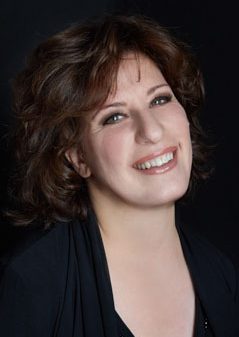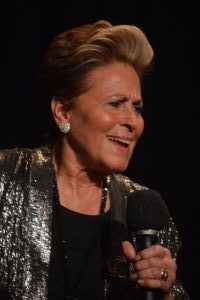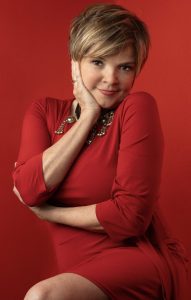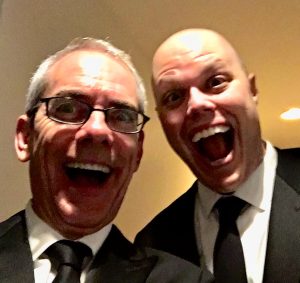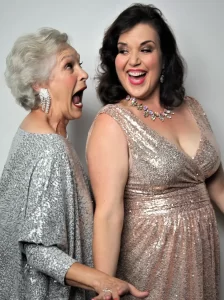A Grab Bag of Cabaret Shows in a Wide Array of Styles
It seems each year the holiday season starts earlier and gets here quicker, and inevitably leaves me with a backlog of reviews to shows I have seen over the past few months in danger of not seeing the light of print before the new year arrives. Here’s what I have, in no particular order.
Josephine Sanges—How My Heart Sings
In a cabaret world of over-produced, over-instrumentalized, over-conceptualized, overdone shows, every once in a while a classic singer/piano/stage show comes along to remind us what an exquisitely entertaining, satisfying experience a “plain and simple” cabaret can be. And in recent years I have seen few as exquisite, as entertaining, and as satisfying as Josphine Sanges’s new show, How My Heart Sings, at Pangea. Everything works, right down to the title, because if one were to imagine what the heart would sound like if it could sing, one would imagine a sound very similar to the elegant, emotionally rich, smartly phrased, and personal vocals of Josephine Sanges.
Music director John Cook supplies the perfect accompaniment on piano – orchestral grandeur where it’s needed, hushed simplicity where it’s called for, inventive, in sync with the emotional journey of the singer, and a true partner in every sense, right down to some evocative vocal backing. Director Jeff Harnar has presented this jewel of a show in a setting that allows every facet to shine, including a beautifully chosen group of songs that tell stories not only within themselves but in their placement and groupings.
Music is the theme of the night, and it is celebrated in all its wonder. One set piece involves a youthful Sanges surviving in high school with the help of her trusty transistor radio—and yes, there’s one on stage complete with retractable antenna. Admittedly this is an idea that has been done before but rarely as charmingly. Not only is there a selection of vintage songs (the Carpenters particularly well-represented) but as the medley progresses, without a word of set-up, it becomes clear that the songs are the soundtrack to a story of young infatuation, delirious first love, teenage angst and doubt, and finally the tragedy of breaking up, leading to a realization of feminist strength (the singer even manages to make Helen Reddy and Ray Burton’s “I Am Woman” stirring!), and the healing power of music. It was just the right mix of memory, joy, romance, sadness and resilience.
An impishly misleading, lounge lizard arrangement of “Fly Me to the Moon” (Bart Howard) serves as a lead-in to a bit of patter and a dramatic, literate, thrilling reworking of the song, making it rivetingly personal. It is as good an argument for the strength of cabaret as an art form as one is likely to witness. In fact, I wish I could bottle it to hand out when needed. But every song is chosen with care and intent and sung with one of the most glorious, impassioned, warm, and powerful voices that cabaret currently has to offer. What a delight! What a singer! What a show! (At Pangea; attended 11/22/24.)
David Mills—Stay Lost
Since he started his residency at Pangea in the East Village after his return to the U.S. from a decades-long stay in the U.K., comedian David Mills has been refining his unique hybrid performance style into what he has dubbed “stand-up cabaret.” His smart, brilliantly observed impressions of life in these increasingly apocalyptic times bristle with a comic’s abrasive voice combined with an actor’s ability to present images and stories defining a world in decline, and a singer’s ability to underscore, intensify, or provide counterpoint to the funniest and most dire ideas and predictions.
The subjects, the stories, the characters, and the set-pieces come fast and furious and involve gay life and the sexual underbelly of New York, the changing landscape of the city, the dangers of endless political corruption and upheaval, a population drowning in entitlement and vapidity, and the continuing aftereffects of colonialism, racism, and fascism. Now that the (last?) election has occurred, his withering dissection of life and times of the modern world will gain even more power, more edge, and more prescience. He follows in the line of great social comics like Lenny Bruce, Richard Pryor, Paul Provenza, and others, but enhanced with daring and on-target song choices by the likes of Willie Nelson, André and Dory Previn, and Charlie Smalls, arranged and accompanied by the exceptional Jody Shelton on piano.
It is not a spoiler to say that the title of the show derives from the comic’s thesis that one answer to it all is to stay off the grid; to stay lost; but even here he can’t resist puncturing that small bit of comfort with a desolate postscript. David Mills will make you laugh, make you think, make you shiver, make you gasp, perhaps even make you weep a little, and he will make you want to come back to see what he has to say next. I can guarantee that after seeing this show you will never think of the song “Native New Yorker” (Sandy Linzer, Denny Randell) in the same way again. (At Pangea; attended 11/16/24.)
Lorna Dallas—Snapshots
Lorna Dallas’s visits to New York are marked by cabaret shows of uncommon taste and elegance, thoughtfully sung, with an easy mix of comedic and dramatic and romantic material. She is at home and at ease with the varied styles and with the help of her accompanist, the great Christopher Denny, and her director, Barry Kleinbort, she always presents the proverbial “class act.”
Her latest show, Snapshots, is no exception. As is so often the case in these post-pandemic times, the past and its memories are the inspiration for the show. It opens with a trilogy of well-chosen numbers that become almost an overture of remembrance. A mature, brilliantly reimagined “(There’s) Always Something There to Remind Me” (Burt Bacharach, Hal David) sets the stage, with particularly fine work from Denny. It is followed by two medleys, and while the show does rely perhaps a bit too much on groupings of songs, most of them work well within the concept and, in a way, fit the “snapshot” idea better than full songs might have.
“London, Dear Old London” (Jerome Kern, P.G. Wodehouse, from The Cabaret Girl) is a buoyant exultation of her adopted home that obviously reflects her own feelings about her life across the Atlantic and leads into Maltby & Shire’s “I Think I May Want to Remember Today” inspired by a conversation with none other than Hyacinth Bucket, the wonderful Dame Patricia Routledge!
I am amazed that her thoughtful, deeply emotional take on La Cage Au Folle’s “Song of the Sand” (Jerry Herman) made me appreciate the song for the very first time. I have never liked it. This is meant as high praise, indeed. An involved and hilarious dissection of “Stranger in Paradise” (Robert Wright, George Forrest, from Kismet) based on her “adventures” with the song in the past, defies description and must be seen (and heard) to be believed. It is so successful in fact that I wish she had committed to more all-out comedy numbers. Another fun, energetic confection is provided by “Flash, Bang, Wallop” (David Heneker, from Half a Sixpence). It is a delightfully unexpected celebration of the early camera (remember those?) so perfectly in keeping with the show’s title. Maury Yeston’s “Simple” (from Nine) is the perfect choice for the delicate, magical journey she makes to “Take the Moment” (Richard Rodgers, Stephen Sondheim, from Do I Hear a Waltz).
At one point in the show Lorna Dallas proclaims with tongue in cheek, “Now back to the dead guys” referring to the songwriters of most of her material. My holiday wish in the case of Ms. Dallas is that she and her team shake loose from tradition and put together a show of songs by contemporary (that is…living) composers. Ricky Ian Gordon, Jimmy Webb, Joni Mitchell, and others have much to offer her in the way of new and exciting material and she has much to offer them with her gorgeous sound and intelligent, thoughtful, emotional phrasing. Piercing the reserve and understatement (and upper register) that blankets most of her performance could prove to be very exciting. (At Chelsea Table + Stage; attended 11/3/24.)
Karrin Allyson—A Kiss for Brazil
Brazilian music and bossa nova have been a seductive siren call to American jazz vocalists and musicians since that girl from Ipanema first sauntered slowly down that beach. Singer/pianist Karrin Allyson, who presented A Kiss For Brazil, at Birdland, is no exception, celebrating in part the release of her new album of the same name. Her stellar band included Vito Gonsalves on piano, keyboards and accordion, Yotam Silberstein on guitar, Harvie S on bass, and Rafael Barata on drums. Each had turns in the spotlight but they were all at their best when joining forces with the sometimes smooth, sometimes raw, always strong and always true vocals of their leader.
Allyson opened with the classic theme from Black Orpheus, “Manha da Carnaval” which has been recorded and sung in many translations, perhaps best known as “A Day in the Life of a Fool,” but she sang lyrics unfamiliar to me. They were perfectly fine, but the number was defined by thrilling wordless vocal runs that blended wonderfully with the other musicians, especially the infectious drumming and the distinct, unusual piano attack. “Attack” is the operative word in the arrangement, and it was a terrific counterpoint to the singers smooth, exhilarating vocals. She was equally comfortable singing in English and in Portuguese and even, at one point, in French when she included “Under Paris Skies (Sous le Ciel de Paris),” a Georgia Gibbs classic by Kim Gannon, Jean Dréjac, and Hubert Giraud. “Double Rainbow” (Antônio Carlos Jobim) kept the traditional Brazilian sound at the fore (with a perfect mix of bilingual lyrics), as did beautiful performances of two of the best—“So Many Stars” (Sergio Mendes, Marilyn & Alan Bergman) and “The Island” (Ivan Lins, the Bergmans, original lyrics by Vitor Martins) which used to be a favorite of Sarah Vaughan who would fan herself after singing the erotically charged number and say, “They didn’t write songs like that when I was coming up!”
Allyson is also a fine songwriter, as evidenced by her “Way Down Below,” sung especially because the elections were a week away. It was recorded on Shoulder to Shoulder, an album honoring the 100th anniversary of the suffrage movement. Even more telling in this political season was the setting of “The New Colossus (Give Me Your Tired),” Emma Lazarus’s poem on the Statue of Liberty, set to a haunting, contemplative underscoring by Laura Caviani; it provided a moment of stunning beauty and hope to a hushed audience in need of it.
The night offered an overview of the best of Karrin Allyson as a singer, a pianist, a composer, and a lyricist. It was a remarkable performance by a remarkable performer at the height of her powers. I could easily have stayed for another hour in her riveting presence. (At Birdland; attended 10/31/24.)
The Ims (Tim Cahill & Jim Harder)—Once You Have Found Im
The names that Tim Cahill and Jim Harder have chosen for their group, The Ims (get it?), and their show, Once You Have Found Im, were a bit of a red flag—too cute and immature for their own good, and for the two accomplished men we saw on the stage as they began the evening that marked their return to New York after a move, a marriage, a pandemic, and the inevitable passage of time.
They chose an interesting group of songs; they have a warm chemistry on stage and a welcoming energy that charmed the audience with “(Where Do I Begin?) Love Story” (Francis Lai, Carl Sigman), “A Sunday Kind of Love” (Barbara Belle, Anita Leonard, Stan Rhodes, Louis Prima) and “Let Me Love You” (Bart Howard), which was given a particularly lovely treatment. As the show progressed it became apparent that they didn’t trust the material to do much of the work, that they felt they had to (over)sell the songs and the sometimes corny patter too much. No joke, pun, or wordplay was allowed to land without cocked eyebrow, a look of mock surprise, an overly conspiratorial aside, or a broad physical gesture to underline it. This gave the show a creaking, old-fashioned feel. About half-way through I began to look for cobwebs in the corners of the stage. Particularly unfortunate was Cahill’s “shocked” and naughty reaction whenever the word “queer” came up in a lyric, which it did a few times. This comedic reaction went out in the last century, or so I had thought.
Harder, while a good musician, also tried too hard on the piano, and as musical director, with an overuse of medleys and needlessly complicated arrangements. Songs were sung together without a real connection—Alec Wilder’s “I’ll Be Around” and Rodgers and Hart’s “Bewitched” are fine songs but each suffers from being sung in tandem with the other. Cahill’s beautiful take on “We’ve Only Just Begun” (Roger Nichols, Paul Williams) was sabotaged by overly busy accompaniment. Neither of them spent enough time just telling the stories in the songs and revealing personal connections to the material. They were too busy “performing.” The songs that worked best, usually simple ballads, were too much alike in feel and delivery so they tended to blur together. This obviously talented couple deserves a better show than the one they devised for themselves. Tim Cahill and Jim Harder have the tools to create a solid cabaret entertainment; they just need to weed out those tools that have become obsolete and concentrate on a more contemporary presentation. (At Don’t Tell Mama; attended 10/26/24.)
The ShowBroads (Marta Sanders and Leanne Borghesi)—Fa-La-La-La Fabulous!
It seems from the start that Fa-La-La-La Fabulous!, the newest show from Marta Sanders and Leanne Borghesi (in the guise of their alter egos, The ShowBroads) are attempting a character-driven hour of holiday merriment. Imagine Patsy and Edina performed by two Ethel Merman impersonators in Absolutely Fabulous and you get some idea.
Both Sanders and Borghesi are blessed with big voices that separately or together, in another endeavor, might be just the thing, but here are pretty much the only thing, Sanders is one of the survivors of the golden age of cabaret and her voice has actually improved with age. And her acerbic wit, here blunted by forced and unfunny writing, shows itself in asides and adlibs giving rise to the most genuine laughs of the show. She has a solo moment midway through the show that is quite good—reminiscing about the old days of New York’s Upper West Side and of cabaret with genuine warmth and humor and feeling, leading to an “I’m Still Here”-styled anthem called “Been Around the Block,” written for her by John McMahon and Jay Jeffries.
A bit later, Borghesi joins her for a moving medley of “How Did We Come to This” (Andrew Lippa, from Wild Party) and “I Don’t Want to Know” (Jerry Herman, from Dear World). Leaving behind their “characters,” the bitter brassiness, the pounding and obvious arrangements, the fake smiles and forced ebullience, and the stiff, Oscar-presenter cringe of the patter, they are simply two talented singers joining forces to make a statement on memory and the passage of time. They are finally freed from the straitjacket they have fashioned for themselves. That number alone makes my Christmas wish that if they do another show, they dub themselves “ShowWOMEN” and leave the “Broads” back in the last century. That is a show I would go to see! (At The Triad; attended 11/3/24.)
###
About the Author
Gerry Geddes has conceived and directed a number of musical revues—including the Bistro- and MAC Award-winning "Monday in the Dark with George" and "Put On Your Saturday Suit-Words & Music by Jimmy Webb"—and directed many cabaret artists, including André De Shields, Helen Baldassare, Darius de Haas, and drag artist Julia Van Cartier. He directs "The David Drumgold Variety Show," currently in residence at Manhattan Movement & Arts Center, and has produced a number of recordings, including two Bistro-winning CDs. He’s taught vocal performance at The New School, NYU, and London’s Goldsmith’s College and continues to conduct private workshops and master classes. As a writer and critic, he has covered New York’s performing arts scene for over 40 years in both local and national publications; his lyrics have been sung by several cabaret and recording artists. Gerry is an artist in residence at Pangea, and a regular contributor to the podcast “Troubadours & Raconteurs.” He just completed a memoir of his life in NYC called “Didn’t I Ever Tell You This?”





